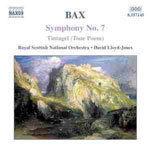
Bax: Tintagel / Symphony No. 7
 $25.00
Low Stock
add to cart
$25.00
Low Stock
add to cart
ARNOLD BAX
Bax: Tintagel / Symphony No. 7
Royal Scottish National Orchestra, David Lloyd-Jones, conductor
[ Naxos / CD ]
Release Date: Tuesday 20 January 2004
Should this item be out of stock at the time of your order, we would expect to be able to supply it to you within 2 - 5 business days.
"From a purely artistic viewpoint, however, no one will regret snapping up this final issue in what has been a highly commendable series." - Gramophone
"The Royal Scottish National Orchestra's acclamied Bax series continues with a striking coupling of his final symphony, the Seventh, and the work with which his name is particularly associated, the tone poem Tintagel. David Lloyd-Jones conducts a Tintagel ripe in sonority and fresh in its restless imagery of an Atlantic seascape. The symphony too, is highly charged with energy...Hearing performances as alive as these makes you wish all the more that Bax would come back into fashion in the concert halls."
- Geoffrey Norris, The Daily Telegraph, 25/10/03
"October's disc of the month from Naxos genuinely deserves its front-running promotional billing, thanks not least to a ripe interpretation of Bax's Seventh Symphony from David Lloyd-Jones and a spell-binding account of Tintagel."
- Music Week, 25/10/03
"The performances from David Lloyd-Jones have set a benchmark, and one doubts they will be equalled let alone surpassed. Each disc has been linked with a tone poem, the RSNO wonderfully atmospheric in Tintagel."
- David Denton, Yorkshire Post, 24/10/03
"The virtues of the earlier instalments from Naxos are maintained here in the Seventh...[Tintagel] is given a fierce dramatic impetus by Lloyd-Jones."
- Andrew Clements, The Guardian, 17/10/03
"From a purely artistic viewpoint, however, no one will regret snapping up this final issue in what has been a highly commendable series."
- Gramophone
Grammy Award Nomination 2005 - Best Orchestral Performance
Arnold Bax was the son of a barrister who had no inclination or financial need to practise at the bar and devoted much of his time instead to antiquarian pursuits and genealogical research. He had traced his Quaker forebears back to the landed gentry of sixteenth-century Surrey, but the surname itself is of Dutch origin, probably short for Bacszoon, 'son of Bac' (like English Jacks for Jackson). There was certainly no Irish blood in the family, and it was Arnold's intuitive response to the narrative poem The Wanderings of Oisin by W.B. Yeats that introduced him, at the age of eighteen, to the distinctive atmosphere of the Celtic world. 'Thereupon', he remarked, 'I instantly became a sort of honorary Irishman'. This revelation immediately prompted him to visit Ireland, where he immersed himself in its culture, history, legends and language. His burgeoning musical style, hitherto under the influence of Wagner, began to absorb elements from Irish folk-music, and his name became associated with the so-called 'Celtic Twilight', though Bax himself later dismissed the gloomy connotations of this phrase as 'bunk' dreamed up by English journalists from the title of an early work by Yeats. He pointed out that 'Primitive Celtic colours are bright and jewelled', an observation echoed by the Welsh composer William Mathias, who wrote that 'Rite and magic, jewelled colours, the spirit of play, haunting wistfulness, lyrical warmth and ardour, and (above all) rhythmic vitality - these are all qualities associated with Celtic art and tradition'. They are also qualities to be found in abundance throughout Bax's music
Tracks:
Tintagel (Tone Poem)
Symphony No. 7



